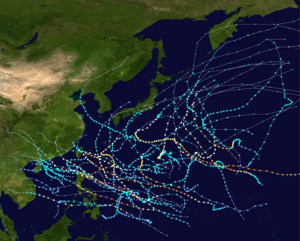
Back 1967년 태풍 Korean Temporada de tufões no Pacífico de 1967 Portuguese ฤดูพายุไต้ฝุ่นแปซิฟิก พ.ศ. 2510 Thai Mùa bão Tây Bắc Thái Bình Dương 1967 Vietnamese 1967年太平洋颱風季 Chinese
| 1967 Pacific typhoon season | |
|---|---|
 Season summary map | |
| Seasonal boundaries | |
| First system formed | January 28, 1967 |
| Last system dissipated | December 21, 1967 |
| Strongest storm | |
| Name | Carla |
| • Maximum winds | 295 km/h (185 mph) (1-minute sustained) |
| • Lowest pressure | 900 hPa (mbar) |
| Seasonal statistics | |
| Total depressions | 40 |
| Total storms | 35 |
| Typhoons | 20 |
| Super typhoons | 5 (unofficial) |
| Total fatalities | 934 |
| Total damage | Unknown |
| Related articles | |
The 1967 Pacific typhoon season was one of the most active Pacific typhoon seasons on record, witnessing the formation of 35 tropical storms during the season. It began on January 1, 1967, though most storms usually form between June and December within the basin. The first storm of the season, Ruby, formed on January 28 west of the Philippines. The scope of this article is limited to the Pacific Ocean, north of the equator and west of the International Date Line. Storms that form east of the date line and north of the equator are called hurricanes; see 1967 Pacific hurricane season. Tropical depressions that are monitored by the United States' Joint Typhoon Warning Center (JTWC) were given a numerical designation with a "W" suffix, and any storms reaching 1-minute sustained winds of over 40 mph were given a name. Tropical depressions that enter or form in the Philippine area of responsibility are assigned a name by the Philippine Atmospheric, Geophysical and Astronomical Services Administration or PAGASA. This can often result in the same storm having two names.
In 1967, the number of storms that the Japan Meteorological Agency considered "typhoons" was the record number (39).[1] However, the JTWC only considers 35 storms to have formed during the season, beginning with Ruby in January. Out of those 35 storms, 20 intensified to category 1-equivalent typhoons, 5 of those further strengthening to super typhoons.
